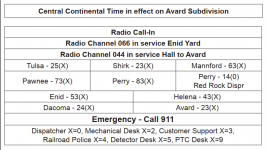ComradeGlock
Member
I was listening to my friends at NS on the Lehigh Line this morning (about MP 51) and to summarize, the crew was having trouble hearing the Dispatcher (this particular dispatcher is difficult to understand as he sounds way overmodulated) so they asked him to repeat, and his response was “never mind, I’ll call you on the phone”.
Now, I thought cell phones were strictly verboten in an active cab environment. Their (illegal) use was the genesis of the entire PTC project.
Did the PTC project bring with it cab mounted LTE radios that he might be referring to as “the phone”?
Is the crew issued cell phones for times when the Dispatcher can’t reach them otherwise?
Your thoughts?
Now, I thought cell phones were strictly verboten in an active cab environment. Their (illegal) use was the genesis of the entire PTC project.
Did the PTC project bring with it cab mounted LTE radios that he might be referring to as “the phone”?
Is the crew issued cell phones for times when the Dispatcher can’t reach them otherwise?
Your thoughts?


